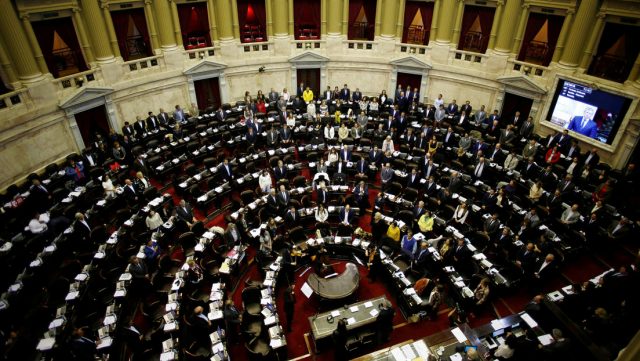The packages of dangerous foods and drinks will have a black seal in the shape of an octagon, as a warning that the products have: excess sugars, sodium, saturated fat, total fat and calories.
The Argentine Congress passed the Front Labeling Law at the end of October, which obliges companies to visibly report, on the packaging of food products, when they contain critical components for human health, such as excess sugars and saturated fats.
The approval in the Chamber of Deputies was overwhelming: there were 200 votes in favor, 22 negative and 16 abstentions. The initiative was supported by the ruling party, leftist leaders and a large part of the opposition alliance related to former President Mauricio Macri. However, weeks ago the conservative bloc of Juntos por el Cambio (Together for Change) had been absent from congress, preventing the session from taking place, postponing the vote for several days. At the time, this caused strong repudiation from social organizations.
In total, the legislative debates lasted two years, while the promoters of the project tried to make the problem visible. In October of last year, approval had been achieved in the Senate. Now, despite the resistance of some corporations and leaders who oppose all kinds of regulation, a long awaited law by doctors and associations fighting against malnutrition will finally be put into practice. In fact, the initiative also has the support of deputies from provinces that produce sugar, such as Tucumán.
What does the law consist of?
Once the law takes effect, food and beverage packages must have a black octagon-shaped seal, as a warning to inform that the products have: excess sugar, sodium, saturated fat, total fat and calories.
The new rule establishes that if the products have sweeteners or caffeine, companies must advise that their consumption is not recommended in children. It is even prohibited to broadcast advertisements that target minors, if the articles have warning labels. Likewise, this kind of food and drink with unhealthy components may not be accompanied by drawings, characters, public figures or any element that attracts the attention of children.
From now on, the Executive Branch has a period of 90 days to regulate the law. For their part, small and medium-sized companies will have one year to adapt, and large firms six months. Likewise, firms that choose to modify their nutrients will enjoy a two-year margin for adaptation.
Fundamentals of Argentina
This class of measures was already used in other Latin American countries, such as Chile, where the same system of octagonal black labels is used as warnings.
In particular, Argentina has very adverse indicators in terms of the diet of its population. In fact, in 2019 the Ministry of Health carried out its fourth National Survey of Risk Factors, with alarming results:
* 66% of the population was overweight
* 32% had obesity
* 40% had high blood pressure
* 30% had high cholesterol
* Among the minors, ages 5 to 17, 41% were overweight
* In children under 5 years of age, 13.6% were overweight
Poor nutrition indicators were also exposed in the Chamber of Deputies: «In Argentina 150 grams of sugars are consumed per day, triple the amount recommended by the World Health Organization (WHO). We are the first in the region and the fourth in the world», said Florencia Lampreabe, the final speaker of the Frente de Todos [Peronism].
«Never in the history of humanity should we have been so far from knowing where the food we eat comes from», concluded the legislator.
Repercussions
This news was widely celebrated by multilateral organizations, especially by offices dependent on the United Nations (UN).
For the entity in charge of the Food and Agriculture areas, better known as FAO, «Argentina took a historic step».
In line, the Pan American Health Organization (PAHO) stressed that the new law «sets guidelines for healthy eating and seeks to reduce the consumption of ultra-processed food products». He also argued that this class of articles «contributes to rising rates of overweight and obesity, and illnesses and deaths related to a poor diet».
Days earlier, the United Nations Children’s Fund, better known as UNICEF, had called for legislation to be passed, to «address malnutrition and poor nutrition, and promote comprehensive health and food sovereignty». In this regard, it stressed that «none of these rights can be a privilege».











